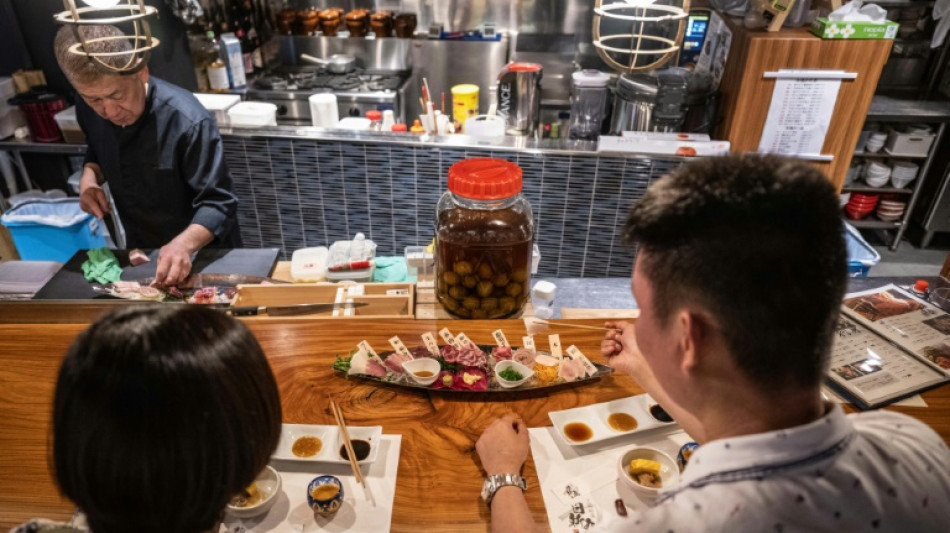
-
 Kasatkina ends WTA season early after hitting 'breaking point'
Kasatkina ends WTA season early after hitting 'breaking point'
-
Paris stocks drop as French PM resigns

-
 Death toll from Indonesia school collapse rises to 63
Death toll from Indonesia school collapse rises to 63
-
Medicine Nobel to trio who identified immune system's 'security guards'
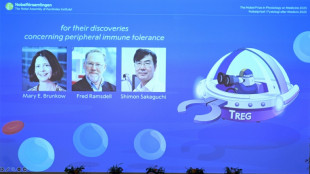
-
 UN rights council launches probe into violations in Afghanistan
UN rights council launches probe into violations in Afghanistan
-
UK author Jilly Cooper dies aged 88
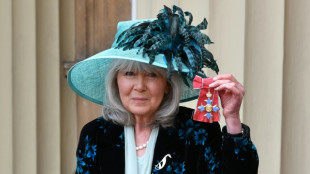
-
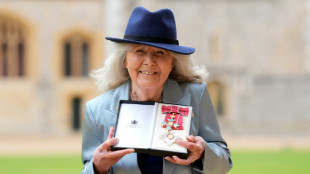 Jilly Cooper: Britain's queen of the 'bonkbuster' novel
Jilly Cooper: Britain's queen of the 'bonkbuster' novel
-
Streaming stars' Le Mans race scores Twitch viewer record

-
 England rugby star Moody 'shocked' by motor neurone disease diagnosis
England rugby star Moody 'shocked' by motor neurone disease diagnosis
-
Leopard captured after wandering into Indonesian hotel
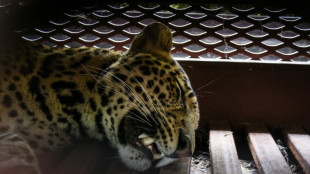
-
 Israel, Hamas due in Egypt for ceasefire talks
Israel, Hamas due in Egypt for ceasefire talks
-
Rescuers scramble to deliver aid after deadly Nepal, India floods

-
 Tokyo stocks soar on Takaichi win, Paris sinks as French PM resigns
Tokyo stocks soar on Takaichi win, Paris sinks as French PM resigns
-
OpenAI offers more copyright control for Sora 2 videos

-
 Australia prosecutors appeal 'inadequate' sentence for mushroom murderer: media
Australia prosecutors appeal 'inadequate' sentence for mushroom murderer: media
-
Rugby World Cup-winning England star Moody has motor neurone disease

-
 Trump says White House to host UFC fight on his 80th birthday
Trump says White House to host UFC fight on his 80th birthday
-
Vast reserves, but little to drink: Tajikistan's water struggles
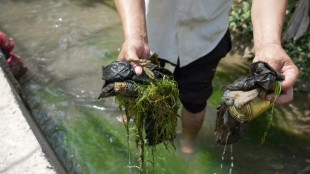
-
 US government shutdown may last weeks, analysts warn
US government shutdown may last weeks, analysts warn
-
Arsenal host Lyon to start new Women's Champions League format

-
 Gloves off, Red run, vested interests: Singapore GP talking points
Gloves off, Red run, vested interests: Singapore GP talking points
-
Bills, Eagles lose unbeaten records in day of upsets

-
 Muller on target as Vancouver thrash San Jose to go joint top
Muller on target as Vancouver thrash San Jose to go joint top
-
Tokyo soars, yen sinks after Takaichi win on mixed day for Asia

-
 China's chip challenge: the race to match US tech
China's chip challenge: the race to match US tech
-
UN rights council to decide on creating Afghanistan probe

-
 Indonesia sense World Cup chance as Asian qualifying reaches climax
Indonesia sense World Cup chance as Asian qualifying reaches climax
-
ICC to give war crimes verdict on Sudan militia chief

-
 Matthieu Blazy to step out as Coco's heir in Chanel debut
Matthieu Blazy to step out as Coco's heir in Chanel debut
-
Only man to appeal in Gisele Pelicot case says not a 'rapist'

-
 Appetite-regulating hormones in focus as first Nobel Prizes fall
Appetite-regulating hormones in focus as first Nobel Prizes fall
-
Gisele Pelicot: French rape survivor and global icon

-
 Negotiators due in Egypt for Gaza talks as Trump urges quick action
Negotiators due in Egypt for Gaza talks as Trump urges quick action
-
'My heart sank': Surging scams roil US job hunters

-
 Competition heats up to challenge Nvidia's AI chip dominance
Competition heats up to challenge Nvidia's AI chip dominance
-
UK police to get greater powers to restrict demos

-
 Guerrero grand slam fuels Blue Jays in 13-7 rout of Yankees
Guerrero grand slam fuels Blue Jays in 13-7 rout of Yankees
-
Five-try Bayonne stun champions Toulouse to go top in France

-
 Fisk reels in Higgo to win maiden PGA Tour title in Mississippi
Fisk reels in Higgo to win maiden PGA Tour title in Mississippi
-
Aces overpower Mercury for 2-0 lead in WNBA Finals

-
 Bayonne stun champions Toulouse to go top in France
Bayonne stun champions Toulouse to go top in France
-
Greta Thunberg among Gaza flotilla detainees to leave Israel

-
 Atletico draw at Celta Vigo after Lenglet red card
Atletico draw at Celta Vigo after Lenglet red card
-
Ethan Mbappe returns to haunt PSG as Lille force draw with Ligue 1 leaders

-
 Hojlund fires Napoli into Serie A lead as AC Milan held at Juve
Hojlund fires Napoli into Serie A lead as AC Milan held at Juve
-
Vampires, blood and dance: Bollywood horror goes mainstream

-
 Broncos rally snaps Eagles unbeaten record, Ravens slump deepens
Broncos rally snaps Eagles unbeaten record, Ravens slump deepens
-
Former NFL QB Sanchez charged after allegedly attacking truck driver

-
 France unveils new government amid political deadlock
France unveils new government amid political deadlock
-
Child's play for Haaland as Man City star strikes again


Japan's new whaling mothership sets sail on first hunt
The chef fires up the grill and bastes a chunky whale steak, a Japanese delicacy that could soon appear on more plates nationwide as a new whaling mothership sets sail despite criticism from conservationists.
Fatty raw pink-and-white whale meat is also on the menu at Nisshinmaru, a restaurant named after Japan's previous huge vessel for catching the marine mammals, now retired after three decades at sea.
The last mothership was aggressively pursued in the Antarctic by activists determined to disrupt operations, but Japan has built an even bigger boat to replace it.
The brand-new, nearly 9,300-tonne lead vessel for Japan's whaling flotilla departed Tuesday on its maiden hunt -- heralding a new era for an industry defended by the government as an integral part of Japanese culture.
Called the Kangei Maru, the ship has "an in-house processing facility where the meat is processed before being refrigerated", explained Ryosuke Oba, the restaurant's manager.
"This ship is like a factory. That's its most attractive feature," he told AFP in the city of Shimonoseki, which has a long history of whaling.
Proudly displayed on the wall at the restaurant is a picture of the Nisshin Maru sailing through icy waters with the word "research" painted in bold letters on its side.
Until Japan pulled out of the International Whaling Commission in 2019, it was criticised for exploiting a loophole in the IWC's moratorium on commercial whaling that allows scientific hunts.
Now the nation has resumed commercial whaling in its own waters, making it one of only three countries who do so along with Norway and Iceland.
- Whaling 'identity' -
"Please catch big whales! Please return safely!" said a letter read by small children who danced at a ceremony as the Kangei Maru set off from Shimonoseki on a months-long hunting expedition along Japan's northeastern coast.
The 7.5 billion yen ($48 million) boat plans to catch around 200 whales by the end of the year.
Senior members of the ship's 100-strong crew were handed bouquets as family members said farewells beside the ship with its fresh coat of blue and white paint.
"This is a new ship for a new era, symbolic of the new period of resumed commercial whaling," announced Hideki Tokoro, president of the whaling company that built the Kangei Maru.
Japan hunts minke, Bryde's and sei whales, and wants to expand the list to include fin whales -- the second-largest animal species on the planet after the blue whale.
"Fin whales can weigh up to 70 tonnes. The ship is equipped with a winch able to lift up a whale that big," Tokoro said.
Japan has hunted whales for centuries, and the meat was a key source of protein in the years after World War II.
Even today it is part of school lunches in Shimonoseki, where a gleaming silver statue of a whale tail stands outside city hall.
But in recent decades the country's appetite for whale meat has dwindled sharply, something the city's mayor Shintaro Maeda is determined to change.
"Our biggest goal is to boost demand for whale meat and raise public awareness of it," he told AFP, describing whaling as "part of Japanese people's identity".
- Food security argument -
Kazuhiro Fujino runs a Shimonoseki whale meat shop and has "high hopes" that increased supply, and the possible fin whale catch, will help drive sales.
"These days, Japan relies on imports for everything," he said, so "it's a good idea to catch whales so that we can supply our own food".
But conservationists dispute this argument, saying whales live for a long time and reproduce slowly, so are not a sustainable food source.
Although campaign groups have slammed Japan's plans, little remains of the international fury seen a decade ago when whalers faced clashes with activists in the Antarctic.
"Commercial whaling in the 21st century is unjustifiable. It's an inhumane practice that exists purely for the profit of a few," campaigners World Cetacean Alliance said this month.
Tokoro said it would be "very unlikely" that the Kangei Maru would go to the Antarctic for commercial whaling.
"If we do, it would be when the government orders us to secure a source of protein due to a crisis, due to famine. In that case, we would be ready to go any time."
C.Koch--VB

